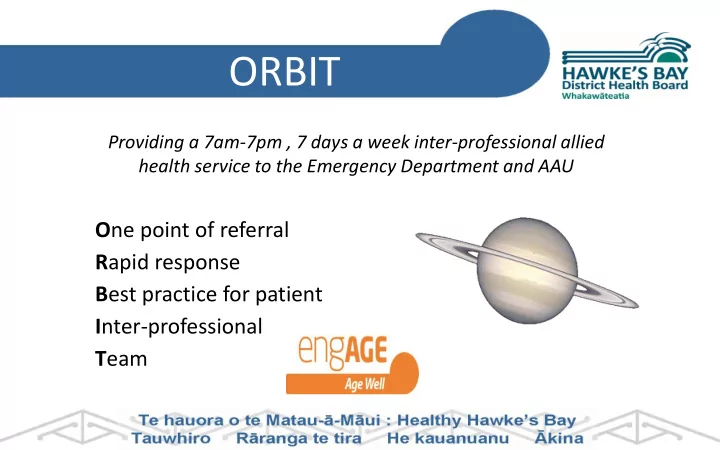

ORBIT Providing a 7am-7pm , 7 days a week inter-professional allied health service to the Emergency Department and AAU O ne point of referral R apid response B est practice for patient I nter-professional T eam
ORBIT was established in ED and AAU on 01/03/2010 PURPOSE: • Prevent unnecessary hospital admissions and promote timely discharges. • Provide a link between hospital, home and community. AIM: • Single point of access to streamline the referral process for patients. • Provide patients with one comprehensive inter disciplinary assessment. • Support the Ministry of Health 6 hour ED Length of Stay Target. • Provide this service to the wider community with a view to preventing presentations to ED (St John Ambulance, GP, Nasc, Napier City Medical).
Inter-professional Practice It is a patient-centered delivery of care model achieved by shared knowledge, abilities, goals, accountability, problem-solving and decision making. It is reliant on mutual trust and respect. Being trained and supported by each other, to carry out the basics of each others roles. All Orbit team members can carry out - 1. Basic mobility assessments 2. Social and functional assessments 3. Refer on for all appropriate supports. 4. Issue Band 1 equipment such as shower stools, walking frames and bed levers.
The benefits of Inter-professional Practice in an Emergency Department? To improve response times for assessments by sharing the work load amongst the team. Patients are not repeatedly asked the same questions from different disciplines (MDT). Maximising the value of shared expertise and collegial support. Continuity of care – same team member sees person on each admission. Alleviates pressure due to staffing shortages. Upskills staff across disciplines, and gives an appreciation / understanding of each other’s profession and level of skill. Reduces the risk of adverse events arising from professionals working in isolation.
What Orbit Offers - 7 days a week • Provides a comprehensive social and functional assessment of essential transfers and mobility. • We also provide Post Traumatic Amnesia assessment, BPPV assessment and treatment. • Assessment of equipment needs, trial and provision of short term loan or permanent equipment as indicated (e.g. shower stools, raised toilet seat, walking aides). • The Orbit Team has a high threshold for risk. Our focus is to assess that someone will be reasonably ‘ok’ to return home and we try not to use the Emergency Department to address long standing issues or as a fast track into residential care or for those requesting admission to address social issues, e.g. homeless.
Appropriate referrals A person who – Has had a acute injury impacting on their ability to function. A functional or mobility decline, or is having recurrent falls. Has equipment or support needs Examples: • Back injury assessment. • Head injury / concussion. • Post relocation of total hip joint replacement. • Fractures - (abled bodied with conservative management). • Vertigo symptoms (physio specific). • Care and Protection, Family Violence, Elder Abuse and Neglect.
Inappropriate Referrals • Requests for Rest Home placement from home or the Emergency Department. • Mental health and Addiction issues and those whose primary need is related to mental health conditions. • Medically unwell people likely to be admitted to hospital or those requiring further medical assessments or investigations. • People requesting housing modifications such as bathroom alterations, ramps, Securing housing or benefits, financial assistance, transport issues - happy to chat, but can’t always provide solutions.
Making Referring Easy • The team have a pager referral system. • We don’t require written referrals. • We have an after hours referral book for ED. • We have an Orbit email for community referrals. • Allocating referrals is done within the team.
Challenges / Barriers • What Orbit is ACTUALLY able to provide to the patient (eg rails, wheelchair for outings, financial assistance, direct access for rest home placement without assessment, 24/7 personal care support). • Patient’s and families expectations hoping to address long standing needs or trying to bypass waiting lists. • While accepting community referrals, ED/AAU remains our focus.
Questions ?
References www.aacn.nche.edu/education-resources/ipecreport.pdf • www.nzaot.com/downloads/contribute/NZAOTInterprofessionalEducationandCollaborativePracticemarch20 • 12.pdf www.ojs.library.ubc.ca/index.php/ubcmj/article/download/426/482 • www.ahc-cas.ca/repo/en/Confirmed%20resources/IP_care1.pdf • www.nursingtimes.net/.../how-interprofessional.../5059052.article • www.journal.nzma.org.nz/journal/123-1320/4270/content.pdf • www.qlibdoc.who.int/hq/2010/WHO_HRH_HPN_10.3_eng.pdf • www.ncbi.nlm.nih.gov/pmc/articles?PMC3081249/ • www.ahwo.gov.au/documents/N3ET/mythbusters_interprofessional.pdf • http://www.clinteach.com.au/assets/Interprofessional-Practice/WHO-HRH-HPN-10.3-eng.pdf. • www.suncountry.sk.ca/gsCMSDisplayPluginFile/.../200 • Framework for Action on Interprofessional Education & Collaborative Practice (WHO). • www. nexusipe.org - The National Centre for Interprofessional Practice and Education. •
Recommend
More recommend